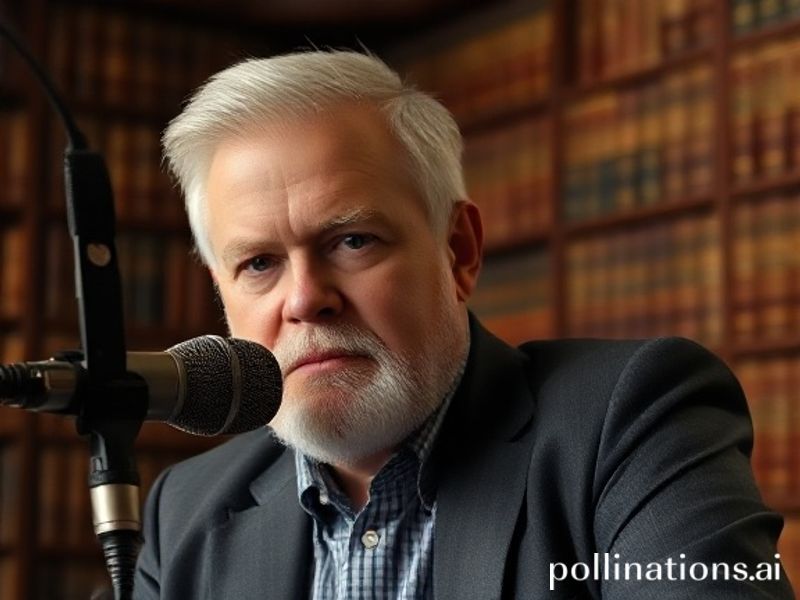From Capitol Hill to Caracas: How Mark Levin’s Apocalyptic Patriotism Became the World’s Background Noise
Mark Levin’s Voice Travels Farther Than His Passport Ever Will
By Our Correspondent in a Café that Still Accepts Cash, Somewhere East of the Atlantic
PARIS—Somewhere in the 14th arrondissement, a retiree from Normandy is muttering about “constitutional originalism” while buttering a baguette. The culprit? A YouTube algorithm that, in its infinite wisdom, decided a Mark Levin podcast—piped through a cracked iPhone screen—was the perfect soundtrack for sunrise. Thus does the voice of a gravel-throated American lawyer ricochet around the planet, proving once again that ideas no longer need visas, only bandwidth.
Levin himself rarely leaves the United States. Why would he? His studio is equipped with enough flags to invade a small island nation, and the world dutifully comes to him—via call-ins from Perth, Perth Amboy, and places in between whose accents would make a UN translator weep. Yet his particular brand of constitutional conservatism has become an unlikely export commodity, the intellectual equivalent of spray cheese: baffling to gourmets, strangely addictive to the hungry.
Europeans, still licking their wounds from Brexit, watch Levin’s monologues with the same anthropological fascination they once reserved for American reality TV. “So that’s how a republic commits suicide in slow motion,” murmurs a Dutch policy wonk, taking notes. Meanwhile, in South Korea—a country that rewrote its own constitution faster than Levin can pronounce “Marbury v. Madison”—late-night taxi drivers quote his rants on administrative law to justify why the central government can’t fix potholes. Imperial overreach is apparently a universal language; subtitles merely add gravitas.
The global appeal isn’t ideological so much as theatrical. Levin performs democracy’s autopsy nightly, waving the Federalist Papers like a crucifix at the vampire of “the deep state.” Abroad, where parliamentary systems collapse with the frequency of cheap lawn chairs, audiences find his apocalyptic tone oddly comforting. If the American experiment—armed with 233 years of parchment and the world’s largest nuclear arsenal—can still implode over a census question, then Hungary’s current constitutional crisis feels downright pedestrian. Schadenfreude: the last truly bipartisan emotion.
Of course, the irony is thicker than the bulletproof glass outside the U.S. Embassy in Athens. Levin champions sovereignty, yet his digital empire depends on transnational corporations that pay tax nowhere and collect data everywhere. Every time he rails against “global elites,” the cloud servers storing his grievances hum in Dublin, cooled by Irish rain and subsidized by EU green-energy credits. One imagines James Madison spinning in his grave, only to be told the centrifugal force is now owned by a consortium in Singapore.
Nor is the influence a one-way street. Brazilian YouTubers remix Levin’s tirades to attack their own Supreme Court, adding samba beats and Portuguese profanity. In India, a nationalist podcast borrows his “liberty versus tyranny” framing to argue for rewriting the world’s largest constitution—because nothing says freedom like 1.4 billion people asking, “Wait, which amendment was that again?” Intellectual property, like democracy, is apparently negotiable.
The darker joke is that Levin’s global footprint may outlast the republic he insists is dying. Long after the last American polling place closes, archived MP3s will still circulate in places that never tasted sweet tea or watched a school board meeting devolve into a cage match. Future historians—probably AI constructs powered by fusion reactors in Reykjavik—will sift through the metadata and conclude that the 21st century’s most successful cultural export wasn’t Hollywood or hip-hop, but the performative panic of a man shouting into a Shure SM7B.
Until then, the rest of us can sip espresso and marvel at the acoustics of decline. Somewhere tonight, a teenager in Lagos is learning the phrase “administrative state” from Levin’s podcast while dodging traffic in a yellow danfo bus. The world keeps shrinking, even as the shouting gets louder. And in that overlapping Venn diagram of comedy and tragedy, Mark Levin’s voice is the echo that refuses to stay inside any border—constitutional, digital, or otherwise.







